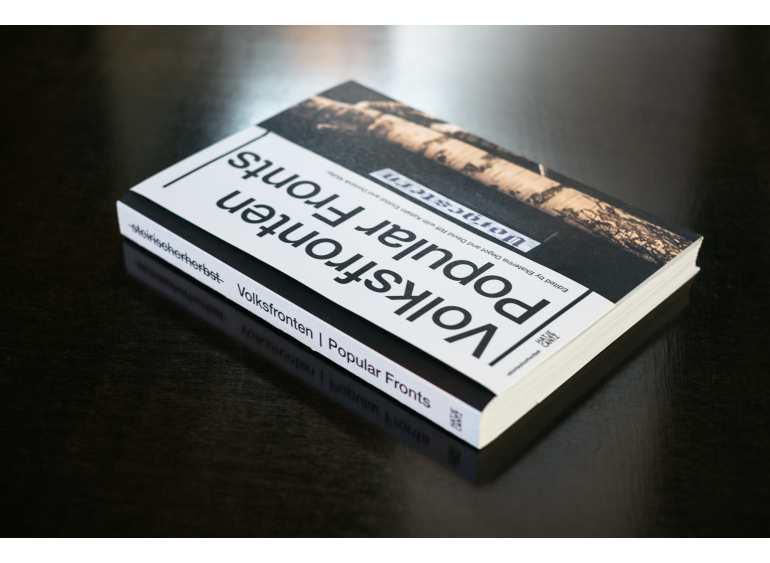While my focus these days is on seeing my two-volume project Forms of Abstraction into print (the manuscript of the first volume is ready), I keep getting distracted by fascism. One symptom of this is the essay “From Fact Check to Counterattack,” which is part of the Volksfronten reader published by Steirischer Herbst, and out now. The Popular Front, the broad anti-fascist coalition of the mid-1930s, was a unique moment of solidarity in European political history. Yet here we controversially use the plural “popular fronts”—thus dispersing and weakening its power. In the German version of the title, Volksfronten, the word Volk stirs up the darkest memories of nationalism and racism. They are not just memories anymore: today nativism seems to be very widely accepted, and identitarianism is found on the right as well as on the left. Adding to the confusion, any new consensus against the rise of nationalism today no longer defines its main enemy as fascism—populism is now the common foe.
The Popular Front, the broad anti-fascist coalition of the mid-1930s, was a unique moment of solidarity in European political history. Yet here we controversially use the plural “popular fronts”—thus dispersing and weakening its power. In the German version of the title, Volksfronten, the word Volk stirs up the darkest memories of nationalism and racism. They are not just memories anymore: today nativism seems to be very widely accepted, and identitarianism is found on the right as well as on the left. Adding to the confusion, any new consensus against the rise of nationalism today no longer defines its main enemy as fascism—populism is now the common foe.
What does that mean for contemporary art, which proclaims its solidarity with ninety-nine percent of the oppressed while still clinging to its avant-garde roots? Is the popular always populist? Is populism just a new name for fascism? Such were the questions central to the 2018 edition of the festival steirischer herbst, entitled Volksfronten for which this book serves as a reader.
The abstraction project is an account of forms of capitalist real abstraction, as articulated by artistic practices under advanced Neoliberalism. “from Fact Check to Counter-Attack” is one of a series of essays responding to the burgeoning backlash against neoliberalism, which may a continuation of neoliberalism by other means—witness the Goldman Sachs boys in Trump’s cabinet, or Alice Weidel in the Adf, or Rees-Moggs and Farage in the Brexit movement.
And yes, all things considered I think it is high time we dispense with euphemisms such as “right-wing populism.” This by now unbearable term has one again been liberally used during the recent EU election. In John Bellamy Foster‘s words, this epithet “reflects the ruling class’s ambiguous relation to the “radical right”—which, for all its supposed ‘radicalism,’ is recognized as fully compatible with capitalism.”
If it quacks like a duck, and walks like a goosestepping duck…
You must be logged in to post a comment.